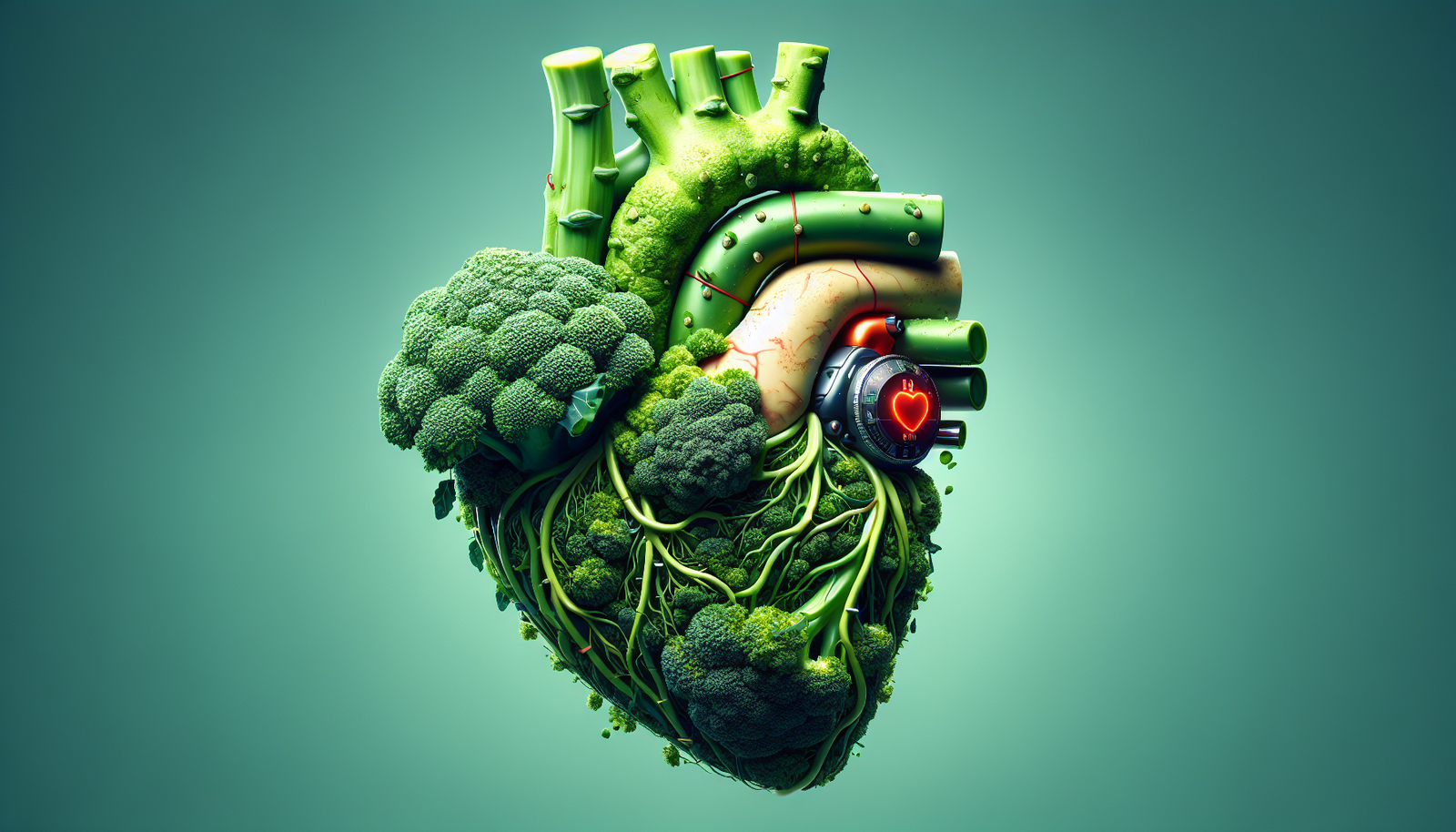Broccoli and Heart Health
Broccoli is a heart-healthy wonder vegetable that offers numerous benefits for cardiovascular health. Understanding the nutrient-rich profile of broccoli and its impact on cholesterol levels can help individuals make informed dietary choices.
Nutrient-Rich Profile
Broccoli is packed with essential nutrients that support heart health. It is a rich source of fiber, vitamin C, vitamin K, iron, and potassium (Healthline). These nutrients play a crucial role in maintaining overall cardiovascular function.
| Nutrient | Amount per 100g | % Daily Value (DV) |
|---|---|---|
| Fiber | 2.6g | 10% |
| Vitamin C | 89.2mg | 99% |
| Vitamin K | 101.6µg | 85% |
| Iron | 0.73mg | 4% |
| Potassium | 316mg | 9% |
A study by Harvard Health Publishing found that individuals who consumed more cruciferous vegetables, such as broccoli, had less calcium buildup in their arteries. Calcium buildup, or calcification, in the aorta is a risk factor for heart attacks and strokes. Women who ate over 44.6 grams of cruciferous vegetables daily were 46% less likely to have high levels of calcified fatty deposits in their aortas compared to those who rarely consumed these vegetables.
Impact on Cholesterol Levels
Broccoli has been linked to a reduced risk of heart disease due to its ability to bind with bile acids in the gut, increasing their excretion and potentially lowering cholesterol levels. A 2008 study highlighted this effect, suggesting that regular consumption of broccoli could contribute to improved cholesterol management.
| Health Benefit | Study Findings |
|---|---|
| Reduced Cholesterol | Broccoli binds with bile acids, increasing their excretion |
| Lowered Risk of Heart Disease | Associated with reduced cholesterol levels |
Including broccoli in your diet can provide significant heart health benefits. For more information on the nutritional value of broccoli and other health benefits of broccoli, explore our related articles.
By incorporating this nutrient-dense vegetable into their meals, individuals can take proactive steps towards maintaining a healthy heart and overall well-being.
Antioxidants and Disease Prevention
Broccoli is packed with antioxidants that play a crucial role in preventing various diseases. This section will delve into the cancer-fighting properties of broccoli and its benefits for eye health.
Cancer-Fighting Properties
Broccoli contains isothiocyanates, including sulforaphane, which have been shown to act against the formation of cancer at a molecular level. These compounds may help reduce the risk of various cancers, including lung, colorectal, breast, prostate, pancreatic, and stomach cancers.
The table below highlights the potential reduction in cancer risk associated with regular consumption of broccoli:
| Cancer Type | Potential Risk Reduction |
|---|---|
| Lung | 15% |
| Colorectal | 17% |
| Breast | 20% |
| Prostate | 18% |
| Pancreatic | 16% |
| Stomach | 14% |
These figures underscore the importance of including broccoli in your diet as part of a cancer-prevention strategy. For more information on broccoli’s role in cancer prevention, visit our page on broccoli and cancer prevention.
Eye Health Benefits
Broccoli is also beneficial for eye health due to its high content of carotenoids, such as lutein and zeaxanthin. These nutrients are associated with a decreased risk of age-related macular degeneration, a leading cause of vision loss (Healthline).
Additionally, broccoli’s beta carotene content, which the body converts into vitamin A, helps prevent vitamin A deficiency. This is crucial for maintaining good eyesight, especially in individuals with low vitamin A intake.
For those interested in maintaining or improving their eye health, incorporating broccoli into your diet can be highly beneficial. To learn more about the health benefits of broccoli, check out our comprehensive guide.
In summary, the antioxidants in broccoli contribute significantly to disease prevention, particularly in reducing cancer risk and promoting eye health. For a deeper dive into the nutritional value of broccoli and its benefits, explore our related articles.
Sulforaphane and Health Benefits
Sulforaphane, a potent compound found in broccoli, offers numerous health benefits. These include anti-inflammatory effects and antibacterial properties, making broccoli an essential addition to a heart-healthy diet.
Anti-Inflammatory Effects
Sulforaphane and other bioactive compounds in broccoli, such as kaempferol, demonstrate strong anti-inflammatory properties. Both animal and test-tube studies have shown that these compounds can reduce markers of inflammation (Healthline). Human studies also suggest that consuming broccoli can lower inflammation, although more research is needed to confirm these findings.
Broccoli also contains potent antioxidants like glucoraphanin, lutein, and zeaxanthin. These antioxidants help reduce oxidative stress and support healthy cells and tissues throughout the body. By reducing inflammation, these compounds may help manage chronic conditions linked to inflammation, such as heart disease.
For more on how broccoli supports overall health, visit our article on the health benefits of broccoli.
Antibacterial Properties
Sulforaphane in broccoli exhibits significant antibacterial properties. Research indicates that it can inhibit the growth of harmful bacteria, including Helicobacter pylori, which is associated with gastric ulcers and gastrointestinal infections. Additionally, broccoli contains compounds such as indole-3-carbinol and phenolic compounds, which have shown inhibitory activity against bacteria like Escherichia coli and Staphylococcus aureus.
These antibacterial effects make broccoli an excellent choice for supporting the immune system and enhancing the efficacy of antimicrobial therapies. The antioxidant compounds in broccoli also help reduce oxidative-stress-induced tissue damage, further supporting the body’s response to infections.
To learn more about the benefits of incorporating broccoli into your diet, check out our article on the benefits of broccoli.
| Compound | Health Benefits |
|---|---|
| Sulforaphane | Anti-inflammatory, Antibacterial, Cancer prevention |
| Kaempferol | Anti-inflammatory |
| Glucoraphanin | Antioxidant, Reduces oxidative stress |
| Indole-3-carbinol | Antibacterial |
| Phenolic compounds | Antibacterial |
For more details on how broccoli impacts your health, read about the nutritional value of broccoli and its role in cancer prevention.
Broccoli’s Impact on Overall Health
Broccoli is not only a heart-healthy vegetable but also offers numerous benefits for overall well-being. From improving digestive health to supporting the immune system, broccoli is a powerhouse of nutrients.
Fiber and Digestive Health
Fiber plays a crucial role in maintaining digestive health. Broccoli is rich in dietary fiber, which aids in digestion and helps prevent constipation. Increasing fiber intake by 10 grams per day can significantly lower the risk of heart disease and improve overall digestive health (CNBC).
| Nutrient | Quantity per Cup (91g) |
|---|---|
| Dietary Fiber | 2.4g |
Consuming fiber-rich foods like broccoli can also help in weight management by promoting a feeling of fullness. For more information on how broccoli can aid in weight loss, check out our article on broccoli and weight loss.
Antioxidants and Immune Support
Broccoli is packed with antioxidants, which play a vital role in supporting the immune system. These antioxidants help neutralize free radicals and reduce oxidative stress in the body, thereby boosting overall health. One cup of raw broccoli contains a significant amount of vitamin C and other essential nutrients.
| Nutrient | Quantity per Cup (91g) |
|---|---|
| Vitamin C | 81 mg |
| Vitamin K | 92 mcg |
| Folate | 57 mcg |
Antioxidants in broccoli include vitamins C and E, which are known to enhance immune function. Including broccoli in your diet can help protect against various illnesses and infections. For more insights on the benefits of antioxidants in broccoli, visit our article on health benefits of broccoli.
Broccoli is a versatile vegetable that can be incorporated into various dishes, making it easy to enjoy its numerous health benefits. Whether you’re focusing on improving your digestive health or boosting your immune system, broccoli is a valuable addition to your diet. For more information on how broccoli affects digestion, read our article on broccoli and digestion.



